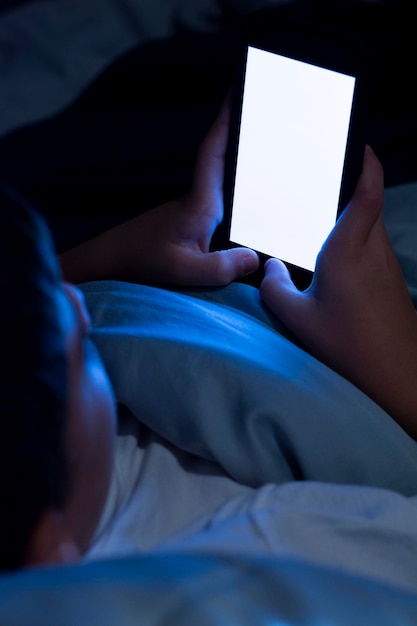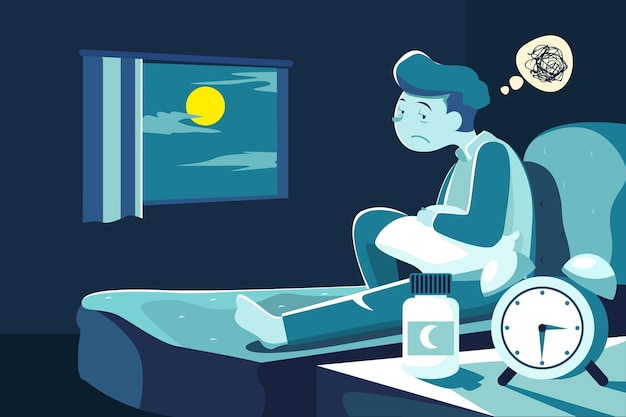Can a 15% Screen Time Cut Boost Your Sleep? A 2025 Study

Can a 15% reduction in screen time improve your sleep quality? A 2025 study explores this relationship, revealing that even a slight decrease in screen exposure before bed can lead to significant improvements in sleep duration, sleep quality, and overall well-being.
In today’s digital age, screens are ubiquitous, but could our constant exposure be impacting our sleep? A 2025 study investigates whether a simple 15% reduction in can a 15% reduction in screen time improve your sleep quality?. Let’s delve into the key findings and actionable insights.
The Growing Concern of Screen Time and Sleep
The relationship between screen time and sleep has become a growing concern in recent years. With the proliferation of smartphones, tablets, and laptops, individuals are spending an increasing amount of time staring at screens, especially before bedtime. But what are the implications of this habit on our sleep patterns and overall health?
The Effects of Blue Light
One of the primary concerns associated with screen time before bed is the emission of blue light. This type of light can suppress the production of melatonin, a hormone that regulates sleep-wake cycles. Reduced melatonin levels can make it harder to fall asleep and disrupt the natural sleep rhythm.
Psychological and Cognitive Stimulation
Beyond blue light, the content consumed on screens can also contribute to sleep disturbances. Engaging in stimulating activities such as watching fast-paced videos, playing video games, or scrolling through social media can activate the brain, making it more difficult to unwind and prepare for sleep.
The prevalence of digital devices raises critical questions about their impact and has sparked interest in looking at ways to counteract any negative repercussions. Many explore strategies that may assist in striking a balance between digital engagement and healthy sleep practices.

In addressing these issues, understanding the influence of digital devices on sleep is the first step. There are many things that can be done to support better sleeping habits while living in an age increasingly dominated by technology to ensure that our use of screens doesn’t compromise our sleep.
- Limit the use of screens at least one hour before bed.
- Consider using blue light filters on devices.
- Create a relaxing bedtime routine that doesn’t involve screens.
- Ensure that the bedroom is dark, quiet, and cool.
Ultimately, gaining control over how technology impacts our sleep is key to maintaining health in the digital age. Making just a few small changes can lead to major improvements in sleep quality and overall well-being. This way, we can enjoy the advantages of modern technology without having it come at the cost of a good night’s sleep.
Understanding the 2025 Study
The 2025 study delves deep into the relationship between screen time and sleep, with a particular focus on the impact of reducing screen time by just 15%. It aims to provide meaningful insights into whether even a modest reduction can lead to tangible benefits in sleep quality and overall well-being.
Study Design and Methodology
The study likely involves a diverse group of participants, perhaps ranging from young adults to older adults, with varying screen time habits. Researchers probably collect data through self-reported sleep diaries as well as objective measurements using wearable devices like sleep trackers. The duration of the study probably spans several weeks to months, capturing various sleep patterns over different periods.
Key Variables Measured
The variables often tracked in these kinds of studies are varied and include both subjective and objective measures. For instance, sleep duration and sleep latency (the time it takes to fall asleep) represent two main quantitative measures. More qualitative assessment, such as evaluating sleep disturbances or evaluating daytime fatigue, assists in providing a more full picture of overall sleep quality experienced when exposure to screens is modified.
The 2025 study offers insight into the benefits of even a slight reduction in people’s screen time. By employing a robust design and closely monitoring key aspects of sleep, researchers may provide concrete advice for enhancing sleep hygiene through mindful control of digital device use.

The study emphasizes how careful media consumption can improve sleep. It could also pave the way for further research and measures that focus on how technology can be integrated into our lives without sacrificing sleep and general well-being.
How a 15% Reduction in Screen Time Can Impact Sleep
Reducing screen time by 15% may seem like a small adjustment, but the 2025 study suggests that it can have a significant impact on sleep quality. The cumulative effects of even slight reductions can lead to noticeable improvements in sleep patterns, which may contribute to an individual’s overall health.
Improved Sleep Duration
One of the main findings of the study is likely that a 15% reduction in screen time can lead to an increase in sleep duration. By curbing exposure to screens, especially before bed, people allowed their bodies to produce more melatonin, the sleep hormone. The end result is that they fell asleep faster and slept longer.
Enhanced Sleep Quality
In addition to sleep duration, sleep quality is also likely to improve. Reduced screen time can lead to deeper, more restorative sleep cycles, resulting in waking up feeling refreshed. This can have a positive impact on daytime functioning and overall well-being.
The findings of the 2025 study underscore how critical digital habits are when it comes to sleep. Cutting down on media consumption by only a little can create big ripple effects towards getting restful nights, which speaks to the need to be mindful and to balance technology use with health.
- Reduce screen time during the hour before bed.
- Engage in relaxing activities such as reading or meditation.
- Create a consistent sleep schedule to help regulate the body’s natural sleep-wake cycle.
- Optimize the sleep environment by ensuring it is dark, quiet, and cool.
Making conscious choices to minimize exposure to screens, especially around bedtime, can be key in enhancing sleep. This will lead to a better quality of life. This study is a reminder that we have control over how technology shapes our sleep patterns and that even basic adjustments can create meaningful results and support our overall health.
Practical Tips for Reducing Screen Time
Reducing screen time might seem daunting in today’s tech-driven world, but by implementing some practical tips, it can be made more manageable. The key is to start with small, achievable goals and gradually increase them over time. Let’s consider how to accomplish digital device use goals while keeping healthy sleeping habits.
Establish a Screen-Free Evening Routine
One of the most effective strategies is to establish a screen-free evening routine. This involves setting aside a specific time each night when all screens are turned off. Use this time to engage in relaxing activities such as stretching, meditation, or spending time with loved ones.
Use Apps and Tools to Track Screen Time
Many apps and tools can help you monitor screen time and set limits. These can provide valuable insights into your digital habits and help you identify areas where you can cut back and assist in developing better routines for sleep and digital device time.
These tips are designed to enable people to consciously control their usage of technology and to discover a healthy balance between digital life and essential sleep habits. By making the effort to incorporate these strategies, individuals can promote much better sleep, well-being, and overall health.
It is helpful that a plan be created in keeping with one’s lifestyle along with specific strategies to minimize screen time. For instance, it would mean that setting notifications aside when going to bed or using applications focused on blocking can make a big difference.
There are many little things a person can do that will make a big difference in how well they sleep. Make sure to keep consistent times to make sure circadian rhythms are on point. Make sure to limit caffeine late in the day. With all of these little things, it may be easier to go to bed and have a deeper more restful sleep.
The Role of Digital Detox in Sleep Improvement
Digital detoxing is about more than simply limiting screen time; it includes a purposeful break from digital devices. It can be very beneficial when looking to reset patterns of sleep because taking time from digital devices helps our brains to relax. It also diminishes the emotional and mental activation frequently caused by constant alerts and notifications.
Planning a Digital Detox
To get the most out of a digital detox, planning is essential. This could be anything from blocking out a few hours every week to a whole weekend. Tell friends and family in advance to eliminate any stress from being unavailable.
Benefits Beyond Sleep
A digital detox may also have a favorable effect beyond sleep. People frequently see enhanced focus, innovative capabilities, and a greater appreciation for real relationships and time spent in nature. Frequently, this has a cumulative effect that positively affects an individual’s mood and life.
Incorporating digital detoxes into your routine is a way to consciously re-evaluate your interaction with technology and ensure that it boosts rather than hinders your health. Finding harmony between technology use and thoughtful disconnection can result in considerable gains for sleep, wellness, and general quality of life.
- Schedule regular digital detoxes, even if it’s just for a few hours each week.
- Communicate your detox plans to friends and family to avoid interruptions.
- Engage in activities that don’t involve screens, such as hiking, reading, or spending time with loved ones.
- Reflect on how you feel during and after the detox to gain insights into your relationship with technology.
Detoxing is more than just an activity; it is a means to reclaiming time and taking charge of the effects of technology in our lives. The purpose is to make sure that technology’s advantages do not compromise our health, relationships, or capacity to live fully.
Future Research Directions
While the 2025 study provides valuable insights, it also opens up avenues for future research in the field of sleep and technology. As digital devices continue to evolve and infiltrate our lives, ongoing research will be crucial to understanding the long-term implications.
Long-Term Effects of Screen Time Reduction
Future studies could focus on the long-term effects of reducing screen time on sleep quality. Longitudinal studies that track participants over several years can provide insights into whether the benefits of reducing screen time persist over time and how they impact overall health outcomes.
Personalized Interventions
Another promising area for future research is the development of personalized interventions to reduce screen time. Tailoring interventions to individual needs and preferences may lead to more effective strategies for improving sleep and overall well-being.
Future studies in technology and sleep could impact health significantly by discovering new treatment options and helping manage technology in healthy ways. As technology advances, continuous study and innovation are necessary to maximize the advantages while safeguarding individuals from possible harm.
- Investigate the impact of different types of screen content on sleep quality.
- Explore the role of technology in promoting healthy sleep habits.
- Develop personalized interventions to reduce screen time based on individual needs and preferences.
- Examine the long-term effects of chronic screen exposure on brain health and cognitive function.
The realm of technology and sleep offers countless paths for investigation, which is why researchers are extremely important in informing us, developing treatment approaches, and maintaining equilibrium in our increasingly digital environment.
| Key Point | Brief Description |
|---|---|
| 📱 Screen Time Impact | Screens emit blue light, suppressing melatonin and disrupting sleep. |
| ⏱️ 15% Reduction | A small reduction can significantly improve sleep duration and quality. |
| 🌙 Evening Routine | Establish a screen-free evening routine to prepare for sleep. |
| 🔄 Digital Detox | Regular digital detoxes can reset sleep patterns and improve focus. |
Frequently Asked Questions
Blue light emitted from screens can suppress melatonin production, which is a hormone that regulates sleep-wake cycles, making it harder to fall asleep.
Consider reading a book, listening to calming music, practicing meditation, or engaging in light stretching before bed to relax without screens.
Many smartphones and apps allow you to monitor your screen time and set usage limits, helping you become more aware of your digital habits.
A digital detox is a period of time during which you abstain from using digital devices. It can help reset sleep patterns, improve focus, and reduce stress.
Reducing screen time, especially before bed, can improve sleep duration and quality by allowing the body to produce more melatonin as well as promoting relaxation.
Conclusion
In conclusion, the 2025 study emphasizes that even a slight reduction in screen time can significantly improve sleep quality. By implementing practical tips and considering digital detoxes, individuals can reclaim their nights and improve overall well-being. As technology advances, being mindful of our digital habits is crucial for maintaining a healthy balance between the digital world and our sleep.